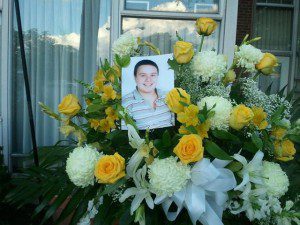 They show up in my news feed a lot – stories of children and adults with autism who wandered off, bolted, went missing and were found dead in a pond less than a mile from home, or something similar. Or news articles about a special needs child who was abused on his bus or in school by some teacher’s aide, or bullied by a classmate, or killed by a member of his own family when caring for him and helping him manage/overcome the most difficult aspects of his special needs became “too much.”
They show up in my news feed a lot – stories of children and adults with autism who wandered off, bolted, went missing and were found dead in a pond less than a mile from home, or something similar. Or news articles about a special needs child who was abused on his bus or in school by some teacher’s aide, or bullied by a classmate, or killed by a member of his own family when caring for him and helping him manage/overcome the most difficult aspects of his special needs became “too much.”
Every day I see these news stories. Some of them I share, some of them I read and others I scroll on past. Because when you’re living a special needs life with your child with autism, you just can’t bear to keep reading about when things go horribly wrong.
Last week on Monday I read in my news feed that 14-year-old Alex Spourdalakis, a young man, nonverbal with severe autism who became the center of a firestorm in the autism community a few months back when he was admitted to a Chicago-area hospital for treatment (and was reportedly kept in restraints and offered psychiatric medicines instead of the gastrointestinal and other testing requested by his mother), had been killed – stabbed several times in his chest.
His mother and Godmother were found next to him, unconscious. A few days later, they were charged with his murder.
I had written about this back in March, offering up what small details I had found out about the story and discussing the ongoing controversy of how medical professionals and the general public choose to treat autism – more so as a psychological disorder rather than investigating medical reasons for how autism spectrum disorder manifests in people.
And since then I had often thought of Alex and his mother as we lived our lives with our son. We, a tight unit of husband, wife, kids, grandparents, friends and support and services all working together to help Lil D. There but for the grace of God … And so my world was rocked to hear the news.
At times like these there are a lot of questions, comments, sadness, anger, frustration and rush to judgment from people in and outside of the autism community. It’s natural – we are humans, we form opinions, often without knowing the whole story or facts. I do. We all do.
How could she? It doesn’t matter how bad things get. How can you harm your child? Why didn’t she do … ? Why didn’t she call … ? If it had become overwhelmingly difficult to care for him, why didn’t she let him be admitted to some institution temporarily so she could have respite? Why? Why didn’t those around her help her more? Why didn’t someone intervene? Where was the media? They are all over this gruesome story now – where was the media when Alex was in the hospital and advocates were trying to get media coverage of his plight?
What could I have done more to help?
What about Alex?
What about my son?
The day after I read about Alex’s death, we had an extremely difficult day with our nearly 13-year-old son, Lil D, who like Alex has severe autism and is nonverbal. I’ve dealt with my fair share of difficult days/aggression/meltdowns/self-injurious behavior with Lil D. Days after weeks after months of trying to help him when he’s literally beating himself up, arching his back and slamming his body on the floor or bed and attacking anyone who tries to block him from hurting himself.
That day Lil D started a meltdown on his community-based instructional (CBI) outing with his therapist, which continued on at home, spiraling out of control into a dangerous situation. He can be quite formidable when he rages, but I’ve rarely felt scared. Helpless, despairing, exhausted – yes. Scared of my own son? No.
But I came close to being scared last week.
In his bedroom he sought the sharp corners of a storage unit to bang his head on. When we blocked that, he tried to bang his head on the frame of his bed, the window sill, or the wall. It was too dangerous in his room, so his therapist and I brought him downstairs to the family room. My husband and other kids, thankfully, were out.
The rage continued on in the family room, as he would leap off the sofa and bang his head on the floor. At one point he climbed from the sofa onto the ledge of the opening between our family room and kitchen area and leapt Donkey Kong-style onto the floor, head first. Thud!
Suffice to say, it was pretty bad, one of the worst I’ve witnessed from him. I was clawed and kicked, and I’m pretty sure his therapist was bit. In between it all, he kept requesting head pressure and folding his ears over. We put pillows on the side of the head and squeezed. It’s what he craved. He was in pain, we addressed it in a variety of ways, and eventually after several hours, things calmed down.
Lil D’s autism is pretty severe, and he has a number of issues that only now are becoming known to us through patient and persistent medical investigations and research. He is a non-responder to most treatments we’ve tried over the years, but figuring out certain things has led to some improvements.
I don’t want to offer opinions or armchair quarterback this tragedy of Alex. But two things keep replaying in my mind over and over and over.
One: Our children – children with autism, children with special needs – they are not a burden. They are not the albatross around our necks. Yes, I’m human and fallible, and at I feel immensely weighed down by the lifelong responsibility I have to care for, help and teach my son. It is hard and it is overwhelming at times. But he is not a burden. Every person with autism and special needs has worth has something to contribute. Just living in Lil D’s sphere has touched and shaped our lives as well as the lives of others in a profound and beautiful way. Anything good in me is because of him and my other children and the grace of Allah.
Alex had worth. Lil D has worth. We all have worth.
Two: If anyone still believes that autism isn’t a crisis or an epidemic, then they are living under a rock. You don’t get statistics like 1-50 because of better diagnosing. Something is amiss here. And as parents and organizations are trying to figure out how to help children with autism, our children are getting older. How are they going to be treated by medical communities when they are in pain or their behavior spirals out of control? Will it be chalked up to “just autism?” Because that’s often a cop-out. Yeah, sometimes I just don’t know why Lil D does what he does. But sometimes I can figure it out.
In the piece I wrote last March, one mother (and friend of mine), whose son has severe autism, is nonverbal and has medically complex issues, said to me,
“In the bigger picture I am scared for all the individuals on the spectrum [who] will be bearing down upon our medical system. What is going to happen to all the adults on the spectrum when they begin to have routine health problems such as hernias and gallbladder attacks and heart attacks? The system is woefully unprepared to care for these individuals, and there is a tidal wave of them heading straight for them in the coming years. Are they going to deny care for all these individuals because they cannot communicate where their pain is? Because they act in the only way they know how to express pain? Honestly, this scares me more than anything.”
Three months ago, I wrote:
“What will happen to Alex? What will happen to the thousands upon thousands of children (and adults) with autism spectrum, so many of them on the severe end of the spectrum and unable to express what is wrong when they are sick? How can the medical establishment at large treat our children? It certainly cannot go the route of what is happening to Alex.”
Because look what happened. There is a lot of blame to share. And there is a lot to learn.
I am in this for the rest of my life with my darling Lil D.
And this – this that happened — cannot be the way.











